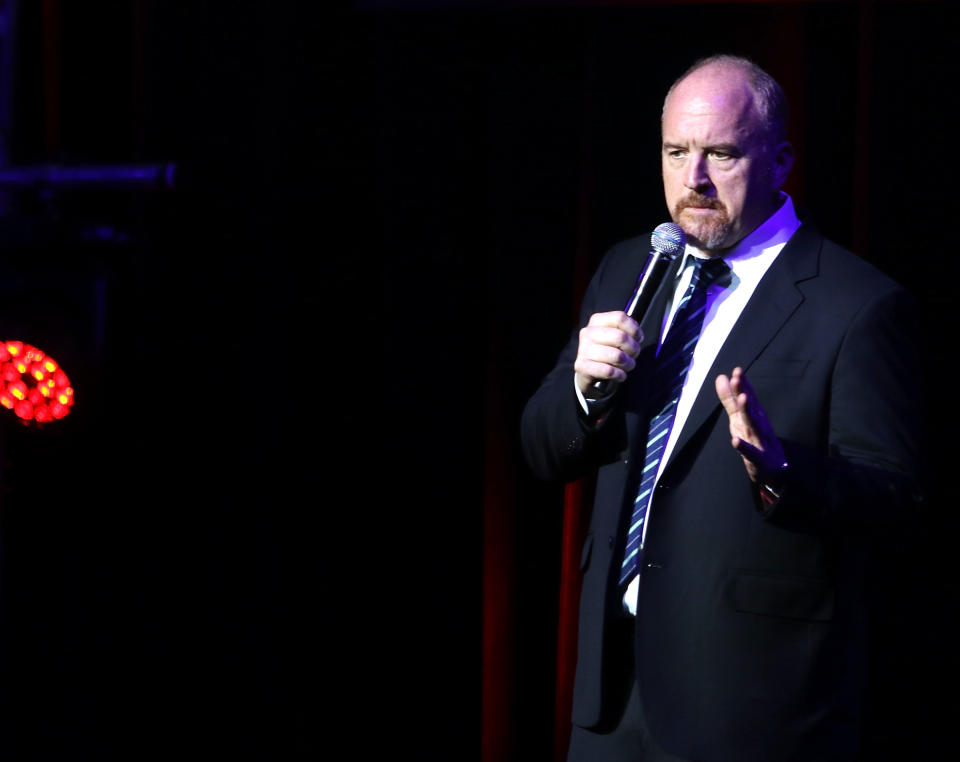Louis C.K.'s joke about his sexual misconduct shows 'he's portraying himself as the victim,' experts say
Weeks after actor Rob Schneider took heat for defending Louis C.K.’s recent standup set — which included a joke mocking the survivors of the Parkland, Fla., shooting — the comedian is coming to his own defense. At a performance in California on Wednesday, C.K. reportedly tried to make light of his fall from grace. “I like to jerk off, and I don’t like being alone,” he said, according to The Daily Beast.
The joke was in reference to sexual misconduct claims raised against C.K. in 2017, when five women told The New York Times that he had masturbated in front of them without their consent. C.K. later issued a statement to the Times that said, “These stories are true.”
“I have been remorseful of my actions,” he continued in the statement. “And I’ve tried to learn from them. And run from them. Now I’m aware of the extent of the impact of my actions. I learned yesterday the extent to which I left these women who admired me feeling badly about themselves and cautious around other men who would never have put them in that position.”
But a little more than a year later, C.K. seems defensive about those actions, repeatedly bringing them up during his set. “If you ever need people to forget that you jerked off, what you do is you make a joke about kids that got shot,” he reportedly said, referencing a joke about the Parkland shooting that was dropped from his set. He also turned things on his audience, suggesting they were complicit in his actions by showing up: “You’ve read the worst possible things you could read about a person, about me, and you’re here.”
People are having mixed reactions on Twitter:
There were a lot of paths Louis could’ve taken. His fans are clearly willing to forgive him and move on. He CHOSE to become an unapologetic hack rather than doing any sort of soul searching. FUCK Louis CK. https://t.co/4avDpo00dy
— Brian (@BrianMarsters) January 17, 2019
Louis CK did no damage. Did he give out those threats? No. Maybe instead of putting the blame on everyone else, women should take responsibility and learn to say no.
— noumuon (@noumuon) January 17, 2019
Go perform your little edgelord schtick at Janeane Garofalo's place, Louis CK. The rest of the world can do without you, your penis, and your hottakes.
— Alexis_Rueal (@Alexis_Rueal) January 17, 2019
I went and saw Louis ck tonight at the improv and it was fun. Louis was really funny. He addressed the controversy at the beginning. He got a standing ovation at the beginning and the end. There were protesters outside but it was all peaceful. It was a really great time.
— Virgilio (@VirgilioBenG) January 17, 2019
The fact that C.K. seems to be doubling down after admitting to the accusations is puzzling. But “there tends to be a general defensiveness whenever someone is busted,” psychologist Karin Anderson Abrell tells Yahoo Lifestyle. “My guess is he’s thinking, ‘I didn’t lock a door, I didn’t have a gun to anyone’s head, I didn’t have anyone pinned down to a bed. She had free will and power to leave at any time.’” In other words, C.K. may have later rationalized that the women weren’t actually victims and he wasn’t actually a perpetrator, Abrell says.

“It’s pretty common for abusers when they’re called to account to see themselves as the victim,” Jaclyn Friedman, author of books on sex and power including Unscrewed: Women, Sex, Power and How to Stop Letting the System Screw Us All, tells Yahoo Lifestyle. “That’s what he’s doing — he’s portraying himself as the victim. That’s a pretty common tactic of abusers who don’t want to heed the call to change when they’re cornered.”
Denial also seems to be at play here, licensed clinical psychologist John Mayer, author of Family Fit: Find Your Balance in Life, tells Yahoo Lifestyle. “Denial is our most primitive and one of the first defense mechanisms that we learn as humans,” he says. “We deny negative situations and pretend that they will disappear and we can go on like ‘normal.’” But, he adds, “denial is not a sophisticated technique, and ultimately it doesn’t work for adults.”
Friedman points out that C.K. “tested the waters” last summer to see if there were still people who wanted to see him perform and “found there were people who saw him as a rebel who won’t conform to the PC police.” “He’s going to gain new followers who are comfortable with the status quo in terms of men being able to abuse and harass women,” she adds, “and he doesn’t have to do any hard work on himself.”
As for why he came out so aggressively, Abrell says it’s human nature to try to excuse things that you do wrong. “We rationalize our choices so that we can put ourselves in a positive light,” she says. “If we see someone else doing something wrong, we attribute that to a character flaw. But if we’re the ones who do something wrong, we rationalize that it was due to the circumstances or a one-time thing, but not a global understanding of our character as a whole.”
But Friedman points out that C.K.’s joke about liking to masturbate and not wanting to be alone is “all you need to know.” “There’s no acknowledgment there that other people get to have preferences — it’s all about what he likes. His victims are just instruments in getting what he likes,” she says. “That’s what was literally the problem in the first place.”
Ultimately, he was right in suggesting that his audience was complicit, Friedman says: “It’s on the rest of us to not enable people to do this.”
Read more from Yahoo Lifestyle:
Follow us on Instagram, Facebook and Twitter for nonstop inspiration delivered fresh to your feed, every day.

